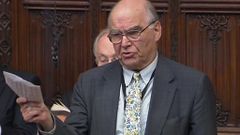Difference between revisions of "David Lea"
m (Text replacement - "=Christ's College, Cambridge" to "=Cambridge University/Christ's College") |
|||
| Line 5: | Line 5: | ||
|image_width=240px | |image_width=240px | ||
|image_caption=[[Lord Lea of Crondall]] calling [[Theresa May]]'s [[Brexit]] Bill "[[The shortest suicide note in history]]" | |image_caption=[[Lord Lea of Crondall]] calling [[Theresa May]]'s [[Brexit]] Bill "[[The shortest suicide note in history]]" | ||
| − | |alma_mater=Christ's College | + | |alma_mater=Cambridge University/Christ's College |
|powerbase=http://www.powerbase.info/index.php/David_Lea | |powerbase=http://www.powerbase.info/index.php/David_Lea | ||
|employment={{job | |employment={{job | ||
Revision as of 07:24, 27 December 2018
 | ||||||||||||
| Born | 2 November 1937 | |||||||||||
| Alma mater | Cambridge University/Christ's College | |||||||||||
| Member of | Hammarskjöld Inquiry Trust | |||||||||||
| ||||||||||||
David Edward Lea, Baron Lea of Crondall in Tyldesley, Lancashire is the former Assistant General Secretary of the Trades Union Congress (TUC) who was ennobled in 1999 and sits on the Labour benches in the House of Lords. Lord Lea has been the co-founder and Vice-Chairman of the All Party Parliamentary Group on Africa since 2002.
In April 2013, Lord Lea publicly stated that fellow peer and former MI6 officer Daphne Park admitted to him shortly before her death that the UK government had organised the 1961 assassination of Congolese leader Patrice Lumumba.[1]
On 3 October 2013, David Lea presented UN Deputy Secretary-General Jan Eliasson with a copy of the Hammarskjöld Commission's report that was issued in The Hague in September 2013 and recommended reopening the UN Inquiry into the 1961 death of Secretary-General Dag Hammarskjöld.[2]
In a House of Lords debate on 13 March 2017, Lord Lea called Theresa May's Brexit Bill "The shortest suicide note in history". Journalist John Rentoul noted that Lord Lea had tried to amend "The longest suicide note in history" in 1983 when he was the TUC's Assistant General Secretary.[3]
Contents
Background
David Lea was educated at Farnham Grammar School and studied at Christ's College (Cambridge), where he graduated with a Master of Arts (M.A.) in Economics. He gained the rank of officer between 1955 and 1957 in the service of the Royal Horse Artillery.
Trades Union Congress
Lea joined the Trades Union Congress (TUC) in 1964 as a research officer. Whilst at the TUC, he was secretary of the TUC-Labour Party Liaison Committee from 1972 to 1994, a member of the Royal Commission on the Distribution of Income and Wealth from 1974 until 1979, the Delors Committee on Economic and Social Concepts in the Community 1977 to 1979, the Kreisky Commission on Unemployment in Europe 1986–89, a member of the Working Party on Economic and Social Concepts in the EEC and a Vice President of the European TUC.[4] From 1978 until 1999 he was Assistant General Secretary.
Hammarskjöld Inquiry Trust
- Full article: Hammarskjöld Inquiry Trust
- Full article: Hammarskjöld Inquiry Trust
David Lea is the Chairman of the Hammarskjöld Inquiry Trust which was established in 2012 as the Enabling Committee to raise and administer funds to support the independent work of the Hammarskjöld Commission, which recommended that the UN should launch a new investigation into the plane crash which killed UN Secretary-General Dag Hammarskjöld, stating that the possibility that the plane was attacked from above, or that it was forced down due to threats, should be "taken seriously, despite everything".[5]
Publications
David Lea wrote the book "Trade Unionism" published in 1966, the book "The Multinational Enterprise" published in 1971, the book "Industrial Democracy" published in 1974 and the book "Keynes Plus: a participatory economy" published in 1979.
Honours and awards
David Lea was appointed an Officer of the Order of the British Empire (OBE) in the 1978 New Year Honours, and was invested as a Fellow of the Royal Society of Arts (F.R.S.A.) in 1993. Lea was made a Labour Life peer taking the title Baron Lea of Crondall on 20 July 1999.[6]
References
External links
- http://www.theyworkforyou.com/peer/lord_lea_of_crondall
- http://www.publicwhip.org.uk/mp.php?id=uk.org.publicwhip/member/100366
- http://www.parliament.the-stationery-office.co.uk/pa/ld200708/ldhansrd/ldallfiles/peers/lord_hansard_1443_home.html
Wikipedia is not affiliated with Wikispooks. Original page source here